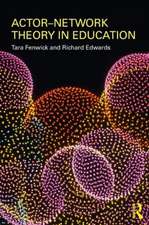Teaching for Excellence
Editat de Marca V. C. Wolfensbergeren Limba Engleză Paperback – 9 oct 2017
Preț: 275.02 lei
Nou
Puncte Express: 413
Preț estimativ în valută:
52.63€ • 54.53$ • 43.92£
52.63€ • 54.53$ • 43.92£
Carte disponibilă
Livrare economică 28 februarie-14 martie
Preluare comenzi: 021 569.72.76
Specificații
ISBN-13: 9783830928232
ISBN-10: 3830928238
Pagini: 212
Dimensiuni: 148 x 210 x 15 mm
Greutate: 0.28 kg
Editura: Waxmann Verlag GmbH
ISBN-10: 3830928238
Pagini: 212
Dimensiuni: 148 x 210 x 15 mm
Greutate: 0.28 kg
Editura: Waxmann Verlag GmbH
Notă biografică
Marca Wolfensberger has been active in honors education for the past two decades. She is an assistant professor and the honors director at the Department of Human Geography and Spatial Planning at Utrecht University. Since 2009, she has headed the research center for Talent Development in Higher Education and Society at the Hanze University of Applied Sciences in Groningen. She is a frequently invited speaker at both national and international institutions and conferences, and she has written many articles, reports, and book chapters on the topic of evoking excellence. Her book on 'Talent for Tomorrow' is widely used for faculty development in the field of teaching highly motivated, talented learners. Wolfensberger was awarded her Master's degree, cum laude, in Regional Geography from Utrecht University. She works also as educational advisor and has co-founded educational programs. Marca Wolfensberger is a member of both policy and research oriented committees related to honors and fostering excellence.
Cuprins
Table of contents List of tables List of figures 1 Introduction 1.1 Research problem and research questions 1.2 Honors education 1.2.1 United States 1.2.2 Outside the United States 1.2.3 Debates about honors 1.3 Conceptual issues 1.4 Relevance of this study 1.5 About this study 2 Honors teaching and the honors teacher, a literature survey 2.1 Introduction 2.2 Honors teaching 2.2.1 Practice: literature about honors teaching 2.2.2 Empirical underpinning: research about teaching gifted students 2.2.3 Theoretical validation: motivational theory 2.2.4 Conclusions 2.3 Honors teachers 2.3.1 Conceptions of teaching 2.3.2 Motivation and self-determination 2.3.3 Perception of (honors) students 2.3.4 Conclusions 3 Methods 3.1 Introduction 3.2 Questionnaire 3.2.1 Design process 3.2.2 Background data 3.2.3 Teaching strategies 3.2.4 Attitudes and beliefs 3.2.5 Data collection 3.2.6 Analysis of the data 3.3 Interviews 3.3.1 Design process 3.3.2 Data collection 3.3.3 Analysis of the data 3.4 Methodological caveats and limitations 4 American honors teachers: thoughts about honors education 4.1 Introduction 4.2 Conceptions of teaching 4.3 Honors education 4.3.1 Outstanding performance 4.3.2 Distinct group 4.3.3 Recruitment 4.3.4 Other themes: innovation, satisfaction 4.4 Motivation 4.5 Students 4.6 Conclusions 5 American honors teachers: approaches in honors education 5.1 Introduction 5.2 Honors classes and regular classes: priorities in teacher behavior 5.3 Teaching approaches - survey results 5.3.1 Creating community 5.3.2 Enhancing academic competence 5.3.3 Offering freedom 5.4 Teaching approaches - teachers' stories 5.4.1 Creating community 5.4.2 Enhancing academic competence 5.4.3 Offering freedom 5.5 Conclusions 6 Dutch honors teachers - questionnaire results and comparisons 6.1 Introduction 6.2 Conceptions of teaching and learning 6.2.1 Dutch honors teachers 6.2.2 Comparison 6.3 Motivation 6.4 Students 6.4.1 Dutch honors teachers 6.4.2 Comparison 6.5 Honors teaching 6.5.1 Dutch honors teachers 6.5.2 Comparison 6.5.3 Teaching approaches 6.6 Conclusion 7 Conclusions and discussion 7.1 Introduction 7.2 Conclusions 7.2.1 Key components of honors pedagogy 7.2.2 Creating community 7.2.3 Enhancing academic competence 7.2.4 Offering freedom 7.2.5 The honors teachers 7.3 Discussion 7.3.1 Limitations of this study 7.3.2 Implications 7.3.3 Avenues for further research Reference list Summary Samenvatting (Summary in Dutch) Appendix 1: Questionnaire Appendix 2: Statistical analyses Acknowledgements




